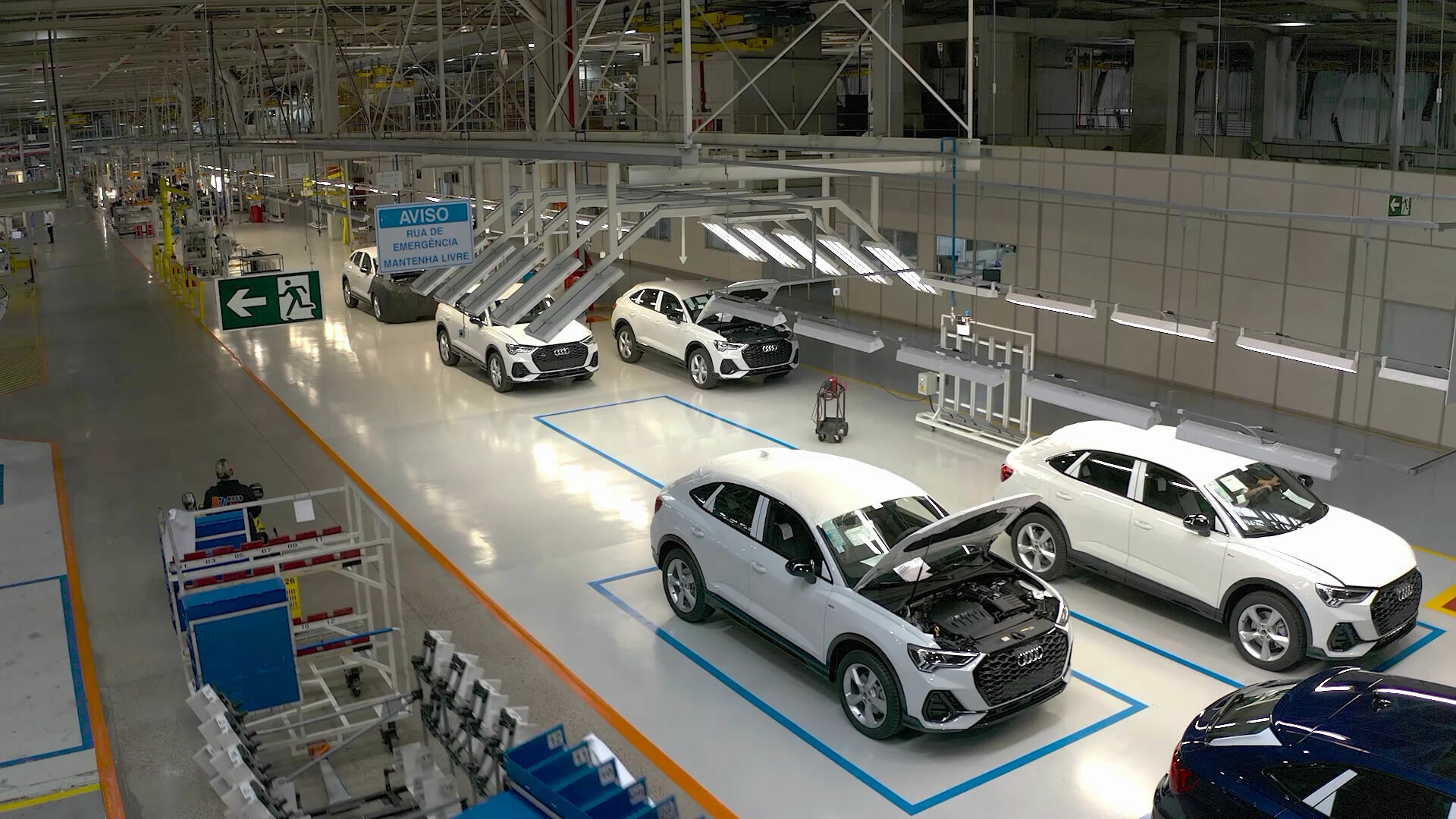Audi do Brasil relaunches its national production line in Paraná with the new Audi Q3 and Q3 Sportback
- With the new Audi Q3 quattro and Q3 Sportback quattro manufactured in São José dos Pinhais (PR), the manufacturer will have an SUV line that is fully equipped with quattro drive in Brazil
- The automaker is investing R$ 100 million to resume production with new machinery, technology and logistics infrastructure, in line with global Audi quality standards
- Resuming production reinforces Audi’s strategy to consolidate its position as the most sustainable and innovative automotive brand in the Brazilian market

Audi do Brasil announces that, from June of this year, it will be resuming the operations of its plant located in São José dos Pinhais, state of Paraná. The announcement was made this Wednesday (29) as part of a ceremony that took place at its Brazilian production plant. In attendance were leading figures from the Brazilian automotive industry and representatives from both the local and federal government, alongside Carlos Massa Ratinho Junior, Governor of the State of Paraná; Nina Singer, mayor of São José dos Pinhais; and Daniel Rojas, President and CEO of Audi do Brasil.
According to Daniel Rojas, CEO of Audi do Brasil, “Audi has a solid and long-lasting relation with Brazil, and even after a brief interruption of the operations in the last year, we always believed in the recovery and growth potential of this country. Thus, the company has made efforts to resume its local production, reinforcing the reliability on the country and on customers with this global product.”
According to Ratinho Junior, Governor of the State of Paraná, “the plant re-opening dangles an optimistic scenario after so many challenging years due to the pandemic, but we could overcome the difficulties and now, gradually, we are resuming the economic activities. We are proud of hosting Audi in Brazil, taking part of this so special journey and we look forward to continue together with this history of great achievements.”
Manufacturing activities will resume with the new Audi Q3 and Audi Q3 Sportback, which are both equipped with a 231 HP 2.0 TFSI engine.
Among the highlights of the new Q3 are the traction quattro and 8-speed tiptronic transmission which equips a vehicle with transverse engine. This enables a smoother, more comfortable shift between gears and represents a technological first.
To facilitate the re-opening of the manufacturing plant, Audi do Brasil invested R$ 100 million Real in modernizing its assembly line, equipping it with new machinery, tooling, quality control equipment and information technology and logistics infrastructure systems. This amount comes on top of a further R$ 446 million that has been invested by the brand over the last ten years.
Initially, the plant will have a maximum production capacity of four thousand vehicles per year, in two shifts, which will initially be sold exclusively within the domestic market. The vehicles will be assembled at the plant via a Semi-Knock Down (SKD) manufacturing process, which provides a highly efficient and technological approach to support its global production requirements.
Audi Q3 and Audi Q3 Sportback with 2.0 TFSI engine production will be produced via an exclusive assembly line, the same that produced the previous SUV generation until 2019. The models will arrive in Port of Paranaguá divided into part assemblies and parts, produced at Audi’s Györ, Hungary plant, ahead of assembly in Brazil.
Local production history
The history of Audi’s manufacturing activities in Brazil started in 1999, with the opening of its plant in São José dos Pinhais, in the State of Paraná. It began producing the domestic first generation Audi A3 until 2006. In 2012, the Brazilian government launched Inovar-Auto, a program to enable technological innovation and incentivize automotive vehicle supply chain consolidation, which prompted Audi do Brasil to relaunch its manufacturing activities in the country once again.To achieve this, the company invested about 150 million Euro, an amount equivalent to approximately R$ 500 million at that time, in the plant located in the state of Paraná.
Production started in 2015 with the A3 Sedan and, in 2016, this was followed by the Q3. SUV manufacturing continued until 2019 until the end of the previous generation life cycle. In parallel, the A3 Sedan was manufactured until 2020 when it reached the end of its life cycle. After this gap Audi will resume the production of two versions of the Q3 model at the plant in the State of Paraná: the new Audi Q3 and Audi Q3 Sportback.
Audi Q3 and Audi Q3 Sportback domestically manufactured
Audi Q3 and Audi Q3 Sportback, both manufactured in Brazil, are equipped with the renowned EA888 2.0 TFSI gasoline engine, comprising 4-cylinders with direct injection and turbocharging with 340 Nm of torque and 231 hp of power.
Since launching in February 2020, the Audi Q3 has become a leader its segment and was the Audi do Brasil’s best-selling vehicle within its first year.
Both incorporate the new design language of the Q-family, introduced in Brazil with the Audi Q8, a completely new brand model. In the front end, one of the main features is the Singleframe grille, which boasts an octagonal design.
The vehicle interior complements the outer design and follows the trend of the brand’s top of the line models. The new Audi Q3 features a center element, the new MMI concept with an 8.8" touch screen that is incorporated within the panel, which is inclined 10 degrees towards the driver for superior ergonomics. The steering wheel with shift paddles is a series item.
Another feature is the highly variable distribution of space: the model features sliding rear seats which can be moved forward by 150 millimeters and 130 millimeters for the Q3 andQ3 Sportback, respectively. The design is further enhanced by the availability of generous storage space – both the Q3 and Q3 Sportback offer a total of 530 liters of space, the highest volume of their class. With the seatbacks fully folded, the total volume reaches 1,525 liters in Q3 and 1,400 liters in Q3 Sportback.
Audi strategy in the Brazilian Market and ESG
The resumption of local production reinforces Audi’s strategy to consolidate itself as the most sustainable and innovative automotive brand in the Brazilian market.
In Brazil, the brand has a series of projects, such as the 100% use of clean energy, from solar panels in its Technical Center (SP) and across its nationwide dealership network. In addition, the manufacturer recently revealed plans to invest R$ 20 million in installing 150-kW DC chargers in 42 brand dealerships across Brazil, offering full compatibility with competing vehicle brands.
Audi do Brasil is committed to the environment and to making a positive impact on society. Its ESG strategy is based on four pillars: electrification, innovation, education and inclusion. It is continuing to develop plans to meet its objectives across these areas.
This motor version is not offered for sale in Germany/Europe.
